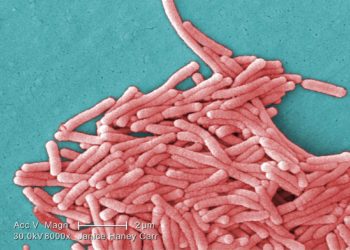Oral microbiome therapy reduced Clostridioides difficile recurrence
1. SER-109, an oral microbiome therapy, showed superiority over placebo in reducing the recurrence of C. difficile infection.
2. SER-109 resulted in the gastrointestinal microbiome and bile-acid profiles known to inhibit Clostridioides difficile (C. difficile) spore germination.
Evidence Rating Level: 1 [Excellent]
Study Rundown: C. difficile infection is a prevalent healthcare burden. It often occurs following exposure to broad-spectrum antibiotics, which disrupt the normal gastrointestinal microbiome. Current standard-of-care antibiotics therapies for C. difficile act by killing the toxin-producing bacteria but do not target the resistant spores, which can rapidly germinate and lead to a recurring infection after treatment discontinuation. Based on the knowledge that Firmicutes bacteria, a member of the healthy microbiome that is affected by antibiotics, can inhibit C. difficile spore germination by modulating gut metabolites, such as bile acids, and prevent recurrent disease. SER-109 is an oral microbiome therapeutic containing live purified Firmicutes spores. The study is a randomized placebo-controlled trial investigating its efficacy in reducing C. difficile recurrence in participants who had experienced recurring C. difficile infections. Over 18 weeks, SER-109 showed superior efficacy in reducing C. difficile recurrence risk compared to placebo, across age groups and initial antibiotics received. SER-109 also showed similar safety profiles to placebo. This trial provided support for a two-pronged treatment approach for patients with recurrent C. difficile infection, including standard-of-care antibiotics followed by a microbiome therapeutic.
Click here to read the study in NEJM
Relevant Reading: SER-109, an Investigational Microbiome Drug to Reduce Recurrence After Clostridioides difficile Infection: Lessons Learned From a Phase 2 Trial
In-Depth [randomized controlled trial]: This study is a Phase 3, double-blind, randomized, placebo-controlled trial to investigate oral microbiome therapeutic SER-109 in treating recurrent C. difficile infection. 182 patients, who had had three or more episodes of C. difficile infection in 12 months, were enrolled. A qualifying infection was determined by symptomatic bowel movements, a positive C. difficile toxin test, and resolution of symptoms following standard-of-care antibiotic therapy. Participants were randomized 1:1 to receive SER-109 or placebo, given as 4 oral capsules once daily over 3 consecutive days after discontinuation of vancomycin or fidaxomicin. Patients were monitored for 8 weeks for C. difficile recurrence and adverse events. Stool specimens were analyzed for microbiome and bile-acid profiling at baseline and after treatment. 12% of patients in the SER-109 group had a recurrence of C. difficile infection, compared to 40% in placebo (relative risk [RR], 0.32; 95% confidence interval [CI], 0.18 to 0.58; P<0.001 for a RR <0.833). SER-109 remained superior to placebo in patients <65 years of age (RR, 0.24; 95% CI, 0.07 to 0.78) and in patients >65 years of age (RR, 0.36; 95% CI, 0.18 to 0.72). Similar trends were observed when patients were stratified by antibiotics received prior to trials (RR, 0.41 [95% CI, 0.22 to 0.79] with vancomycin and 0.09 [95% CI, 0.01 to 0.63]). In the SER-109 group, Firmicutes species were observed in stool specimens by week 1, persisted through week 8, and remained higher than in the placebo group throughout. This was paralleled in greater increases in secondary bile acids in the SER-109 group compared to placebo, a metabolite change known to inhibit C. difficile spore germination. Adverse events were mostly gastrointestinal and similar between the two groups. These results demonstrated the efficacy of SER-109 in reducing the risk of C. difficile recurrence following standard antibiotic therapies and provided support for its use to achieve sustained resolution of C. difficile infection.
Image: PD
©2022 2 Minute Medicine, Inc. All rights reserved. No works may be reproduced without expressed written consent from 2 Minute Medicine, Inc. Inquire about licensing here. No article should be construed as medical advice and is not intended as such by the authors or by 2 Minute Medicine, Inc.







